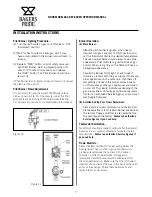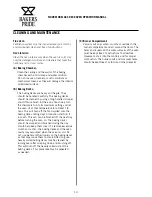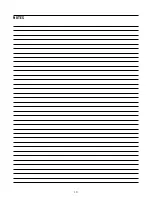
FLOOR MODEL GAS DECK OVEN OPERATION MANUAL
6
INSTALLATION INSTRUCTIONS
(h) The gas pressure regulator is part of the
combination valve and is adjusted to yield a
pressure of 3.5”water column (9mbar) for Natural
Gas. If the oven is ordered for use on Propane Gas,
the pressure regulator in the combination valve
is preset at the factory to yield a pressure of 10”
water column (25 mbar). Units for use on Propane
Gas are not available for European Community
Countries.
(i) A separate shut-off valve for each oven must be
provided. It should be as close as possible to the
place where the gas supply line goes into the oven.
It must be located such that it is easily accessible.
(j) When stacking with another oven, two shut-off
valves, one for each of the two ovens, must be
provided.
Do not put a damper in the flue and do not
connect a blower directly to the flue.
NOTICE
Flue Diverter
(For use w/
Collection
Hood)
Figure 1
Draft Hood
(For use
w/Direct
Venting)
Figure 2
Figure 3
Main Burner Safety Pilot Operation:
The purpose of the safety pilot system is to lock the
gas supply to the main burner at the safety valve, if for
any reason the pilot burner is not lit. Oven should be
re-lighted by following the steps given below. However,
in normal service, the pilot flame stays lit indefinitely,
day and night or weekends. This prolongs the life of the
safety valve.
The safety pilot valve is in effect a two-stage control.
After initial lighting, the pilot burner stays on without the
gas cock dial being held pressed in. After 1-2 minutes,
the valve opens fully to let the gas flow past the safety
pilot valve into the burner system.
After the Gas Supply has been connected, it is
extremely important to check all the piping for
leaks. Use a soap and water solution or a product
expressly made for this purpose. Do not use
Matches, Candles or a flame etc to check leaks
since these methods are extremely dangerous.
WARNING
Flue Connection - Ventilation:
(A) Installation Under Ventilation Hood (Standard):
If the oven is installed under a collection hood,
use the flue diverter (Fig. 1) supplied. Local
inspectors and ventilation and environmental
specialists should be consulted so that the design
and the installation of the hood conforms to the
local/ municipal codes (see Fig. 3).
(B) Direct Venting (Optional) Not Available For European
Community Countries:
If direct venting, it is necessary to install a draft
hood (Fig. 2). The flue pipe from the draft hood
must not run downwards at any point from the
oven to the final outlet. It should always slant
slightly upwards. For best results it should rise
straight up.
If the flue runs directly to the free air outside the
building, use a wind deflector or a UL listed vent cap at
the end of the flue pipe. Termination of the vent must
be at least 2 feet above the highest part of the roof
within 10 feet (Ref: American Gas Association Catalog
No.Xh0474).








































